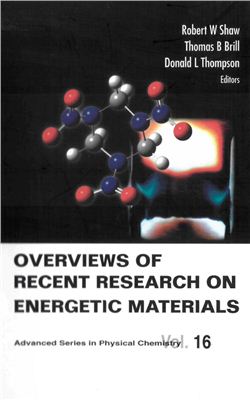World Scientific Publishing Company, 2005, Pages: 509
Few books cover experimental and theoretical methods to characterize decomposition, combustion and detonation of energetic materials. This volume, by inteationally known and major contributors to the field, is unique because it summarizes the most important recent work, what we know with confidence, and what main areas remain to be investigated. Most chapters comprise summaries of work spanning decades and contain expert commentary available nowhere else. Although energetic materials are its focus, this book provides a guide to mode methods for investigations of condensed and gas-phase reactions. Although these energetic reactions are complex and difficult to study, the work discussed here provides readers with a substantial understanding of the behavior of materials now in use, and a predictive capability for the development of new materials based on target properties.
Connecting Molecular Properties to Decomposition, Combustion, and Explosion Trends
Thermal Decomposition Processes of Energetic Materials in the Condensed Phase at Low and
Moderate Temperatures
Study of Energetic Material Combustion Chemistry by Probing Mass Spectrometry and
Modeling of Flames
Optical Spectroscopic Measurements of Energetic Material Flame Structure
Transient Gas-Phase Intermediates in the Decomposition of Energetic Materials
Role of Excited Electronic States in the Decomposition of Energetic Materials
Gas-Phase Kinetics for Propellant Combustion Modeling: Requirements and Experiments
Gas-Phase Decomposition of Energetic Molecules
Modeling the Reactions of Energetic Materials in the Condensed Phase Multi-Phonon Up-Pumping in Energetic Materials
Applications of Theoretical Chemistry in Assessing Energetic Materials for Performance or Sensitivity
Combustion and Ignition of Nitramine Propellants: Aspects of Modeling, Simulation, and Analysis
Buing-Rate Models and Their Successors, A Personal Perspective
Ideas to Expand Thinking About New Energetic Materials
Few books cover experimental and theoretical methods to characterize decomposition, combustion and detonation of energetic materials. This volume, by inteationally known and major contributors to the field, is unique because it summarizes the most important recent work, what we know with confidence, and what main areas remain to be investigated. Most chapters comprise summaries of work spanning decades and contain expert commentary available nowhere else. Although energetic materials are its focus, this book provides a guide to mode methods for investigations of condensed and gas-phase reactions. Although these energetic reactions are complex and difficult to study, the work discussed here provides readers with a substantial understanding of the behavior of materials now in use, and a predictive capability for the development of new materials based on target properties.
Connecting Molecular Properties to Decomposition, Combustion, and Explosion Trends
Thermal Decomposition Processes of Energetic Materials in the Condensed Phase at Low and
Moderate Temperatures
Study of Energetic Material Combustion Chemistry by Probing Mass Spectrometry and
Modeling of Flames
Optical Spectroscopic Measurements of Energetic Material Flame Structure
Transient Gas-Phase Intermediates in the Decomposition of Energetic Materials
Role of Excited Electronic States in the Decomposition of Energetic Materials
Gas-Phase Kinetics for Propellant Combustion Modeling: Requirements and Experiments
Gas-Phase Decomposition of Energetic Molecules
Modeling the Reactions of Energetic Materials in the Condensed Phase Multi-Phonon Up-Pumping in Energetic Materials
Applications of Theoretical Chemistry in Assessing Energetic Materials for Performance or Sensitivity
Combustion and Ignition of Nitramine Propellants: Aspects of Modeling, Simulation, and Analysis
Buing-Rate Models and Their Successors, A Personal Perspective
Ideas to Expand Thinking About New Energetic Materials

